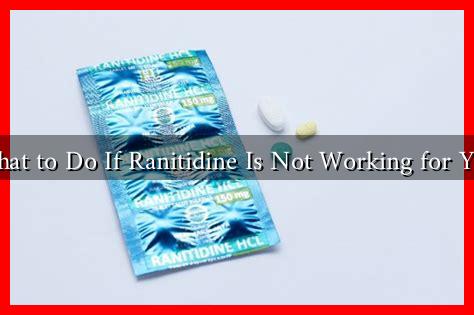-
Table of Contents
What to Do If Ranitidine Is Not Working for You
Ranitidine, a medication commonly used to treat conditions like gastroesophageal reflux disease (GERD) and peptic ulcers, has been a go-to solution for many individuals suffering from excess stomach acid. However, some patients may find that ranitidine is not effective for their symptoms. If you are among those who have not experienced relief, it’s essential to explore alternative options and strategies. This article will guide you through what to do if ranitidine is not working for you.
Understanding Ranitidine and Its Mechanism
Ranitidine belongs to a class of drugs known as H2 blockers, which work by reducing the amount of acid produced by the stomach. It is often prescribed for:
- Gastroesophageal reflux disease (GERD)
- Peptic ulcers
- Zollinger-Ellison syndrome
- Heartburn and indigestion
Despite its effectiveness for many, ranitidine was withdrawn from the market in 2020 due to concerns about contamination with a potential carcinogen, N-nitrosodimethylamine (NDMA). This has led to increased scrutiny and a search for alternatives among patients who previously relied on this medication.
Identifying the Reasons for Ineffectiveness
If ranitidine is not providing the relief you need, it’s crucial to identify the underlying reasons. Some common factors include:
- Incorrect Dosage: The prescribed dosage may not be sufficient for your condition.
- Underlying Conditions: Conditions like gastroparesis or functional dyspepsia may require different treatment approaches.
- Dietary Factors: Certain foods and beverages can exacerbate symptoms, counteracting the effects of ranitidine.
- Drug Interactions: Other medications you are taking may interfere with ranitidine’s effectiveness.
Alternative Medications
If ranitidine is not working for you, consider discussing alternative medications with your healthcare provider. Some options include:
- Proton Pump Inhibitors (PPIs): Medications like omeprazole and esomeprazole are often more effective for severe acid-related conditions.
- Antacids: Over-the-counter options like Tums or Maalox can provide quick relief for occasional heartburn.
- Other H2 Blockers: Famotidine (Pepcid) and nizatidine (Axid) may be suitable alternatives.
Lifestyle and Dietary Modifications
In addition to medication, lifestyle and dietary changes can significantly impact your symptoms. Consider the following strategies:
- Avoid Trigger Foods: Common triggers include spicy foods, citrus, chocolate, and caffeine.
- Eat Smaller Meals: Consuming smaller, more frequent meals can help reduce acid production.
- Maintain a Healthy Weight: Excess weight can put pressure on the stomach, leading to increased acid reflux.
- Elevate Your Head While Sleeping: Using a wedge pillow can help prevent nighttime symptoms.
Consulting a Specialist
If you continue to experience symptoms despite trying alternative medications and lifestyle changes, it may be time to consult a gastroenterologist. They can perform diagnostic tests, such as an endoscopy or pH monitoring, to better understand your condition and recommend appropriate treatments.
Case Studies and Statistics
Research indicates that approximately 30% of patients with GERD do not respond adequately to H2 blockers like ranitidine. A study published in the American Journal of Gastroenterology found that patients who switched to PPIs experienced a significant reduction in symptoms compared to those who continued with H2 blockers.
Conclusion
If ranitidine is not working for you, it’s essential to take proactive steps to manage your symptoms. By understanding the reasons for ineffectiveness, exploring alternative medications, making lifestyle changes, and consulting a specialist, you can find a more effective solution for your acid-related conditions. Remember, effective management often requires a multifaceted approach, and what works for one person may not work for another. Always consult with your healthcare provider before making any changes to your treatment plan.

